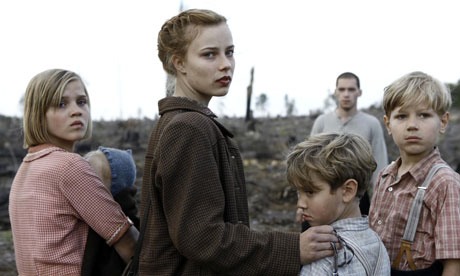
Cate Shortland (Germany/Australia 2012)
SALU/DVD/LOR/SF
105 min
Language: Deutsch
Subtitles: English, French
Deutschland nach dem Krieg: Lore (Saskia Rosendahl) ist mit 15 Jahren für sich und ihre vier jüngeren Geschwister verantwortlich, da ihre Eltern (Ursina Lardi und Hans-Jochen Wagner) als ranghohe Nationalsozialisten festgenommen wurden. Gemeinsam stehen die Kinder vor der schweren Aufgabe, sich nach der Kapitulation Deutschlands quer durch das vom Krieg zerstörte Land zu schlagen, um an die nördliche Küste zum sicheren Hof der Großmutter zu gelangen. Doch der Weg durch die Zonen der Alliierten ist lang und gefahrenvoll und Kälte und Hunger machen das Vorankommen schwer für Lore und ihre Brüder und Schwestern. Als sie zwischendurch auf den jüdischen Flüchtling Thomas (Kai Malina) treffen und Lore ihre ersten amourösen Sehnsüchte verspürt, bekommt ihr einst so gefestigtes Weltbild immer mehr Risse. (filmstarts http://www.filmstarts.de/kritiken/204137.html )
Given its transnational provenance – its Anglo-German source novel adapted by a British-Bengali screenwriter, its Australian director and its bleak Nazi-era subject matter – I'm reluctant to dub Lore a straightforwardly German movie. This might seem counterintuitive given its story: a 14-year-old German daughter of prominent Nazis is left to trek northwards across a ruined Germany in the weeks after the Nazi collapse, her infant siblings and a displaced Jewish boy in tow, and her Nazi assumptions slowly unravelling.
That bald summary might induce one to categorise Lore in the long and honourable line of movies set against the death-seizures of Hitler's regime. That line stretched from Rossellini's Germany Year Zero, shot contemporaneously in 1947 in the actual smoking ruins, to 2008's Anonyma, in which sexual servitude is seen as one woman's only sane response to the possibility of repeated rape in Russian-occupied Berlin. The context of Lore is everything you don't see in Downfall, the epic account of Hitler's last days, and more reminiscent of the early stories of Heinrich Böll, with an added pinch of the documentary Hitler's Children. However, the imagery in those works is largely of recrimination, rubble and rape, whereas Lore is largely rural and rustic – though rape and murder are not absent – and thus more poetic than its documentary-like predecessors.
The most German thing you can call Lore – at whose core is the inexorable unravelling of Nazi brainwashing and its replacement by a boiling adolescent rage – is an anti-bildungsroman. That's to say that, unlike Goethe's Wilhelm Meister or Young Werther, and more like Huckleberry Finn (another rural road movie), the things that are learned in adolescent extremis do not equip one to join society on equal terms; they prompt one to reject it utterly. All this is rendered in a single, small-scale but powerful act of childish rebellion at the film's end.
To me, though, it doesn't feel like a German movie. Its lyrical beauty, its focus on children and its handheld camerawork by Adam Arkapaw feel far more French or Polish (see Wajda's Ashes And Diamonds, set in the same few weeks). This links it up with a movie about a similar collapse when the jackboot was on the other foot, the catastrophic French defeat of 1940. In René Clément's 1952 masterpiece Jeux Interdits, the roads out of Paris clogged with a million evacuees, one suddenly orphaned five-year-old girl carrying her dead dog (and I think it really was a dead dog) wanders through a universe of malign peasants and overarching death. Lore hasn't the budget or the desire to paint that epic picture (Clément had bombers, explosions, thousands of extras), but it instead works up a miniature of similar moments in a parallel sector of the dark vale of infancy. It does it quite impressively, too. (Guardian)